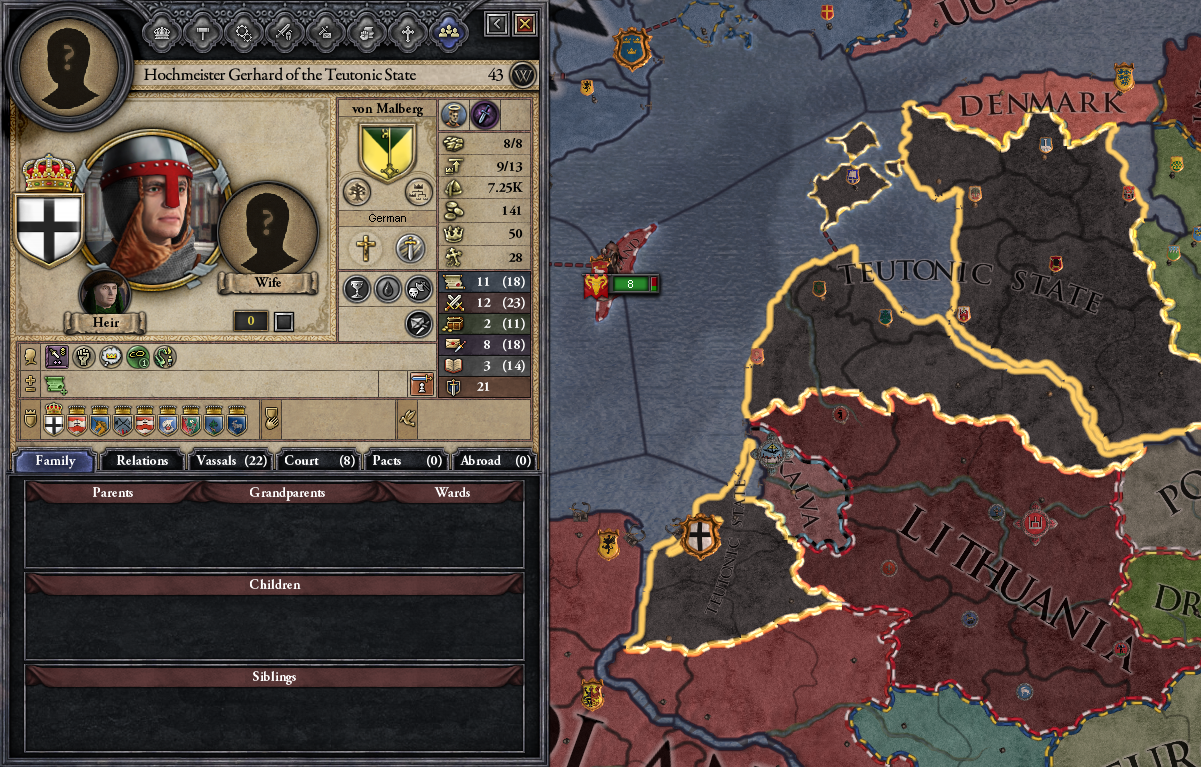Hello there!
We are already more than halfway through July, and we are already at the third of the five rogue Dev Diaries we will have. For this week’s Dev Diary, we are going to talk about Holy Orders, and the small changes being made to them.
I am going to start off with clarifying that Holy Orders are NOT going to be made playable. The changes are made so you can interact with them in new ways, not for you to play as them. The game is still focused on dynasties, and that has not changed with Holy Fury. Another thing I want to note, is that all these changes to Holy Order are part of the patch to Holy Fury, and not part of the expansion. In other words, you will not have to pay for them.
And as always, certain things might change before the release of Holy Fury.

With their own government form rather than being Feudal, it is easier for us to treat them as their own entities, and not having the player awkwardly inherit one of them, with all their own quirks and special focuses. They should be easier to distinguish from a normal Feudal character as well, now that they have their own frames rather than the Feudal blue.

Some of the other Christian Holy Orders have received decisions for forming and vassalizing them as well, in addition to the old decisions for the Knights Hospitaller and the Knights Templar. In the example above, you can see the decision to vassalize the Knights of Calatrava, and we have added similar ones for the Knights of Santiago, the Teutonic Order and the Brotherhood of the Holy Sepulchre.
A new limitation we have added, is that you can only vassalize 1 Holy Order at a time with these decisions. This was to make sure we didn’t have one player changing religions and trying to capture all of them. This is Crusader Kings 2, after all, not Pokémon.

If you have vassalized a Holy Order and they don’t find you fit to rule anymore, they will leave your service. They will return any land they hold that you are the De Jure Lord of, so with that in mind you usually shouldn’t lose large swathes of land if a Holy Order leaves your service. Though I would recommend staying on friendly terms with them.

For the Knights Hospitaller, they can now ask a ruler conquering an island in the mediterranean to donate it to the order. We have added a similar event for the Teutonics in the north, replacing the old event where they asked for a single county.

... So that is all for today!
Hopefully the Holy Orders will be a tad more interesting with some of these changes. Next week we will take a look at… Let me take a look at my notes here… “Shepherds, zealous kids and Venetians burning down Byzantium”? Surely that’ll be exciting news!
We are already more than halfway through July, and we are already at the third of the five rogue Dev Diaries we will have. For this week’s Dev Diary, we are going to talk about Holy Orders, and the small changes being made to them.
I am going to start off with clarifying that Holy Orders are NOT going to be made playable. The changes are made so you can interact with them in new ways, not for you to play as them. The game is still focused on dynasties, and that has not changed with Holy Fury. Another thing I want to note, is that all these changes to Holy Order are part of the patch to Holy Fury, and not part of the expansion. In other words, you will not have to pay for them.
And as always, certain things might change before the release of Holy Fury.

With their own government form rather than being Feudal, it is easier for us to treat them as their own entities, and not having the player awkwardly inherit one of them, with all their own quirks and special focuses. They should be easier to distinguish from a normal Feudal character as well, now that they have their own frames rather than the Feudal blue.

Some of the other Christian Holy Orders have received decisions for forming and vassalizing them as well, in addition to the old decisions for the Knights Hospitaller and the Knights Templar. In the example above, you can see the decision to vassalize the Knights of Calatrava, and we have added similar ones for the Knights of Santiago, the Teutonic Order and the Brotherhood of the Holy Sepulchre.
A new limitation we have added, is that you can only vassalize 1 Holy Order at a time with these decisions. This was to make sure we didn’t have one player changing religions and trying to capture all of them. This is Crusader Kings 2, after all, not Pokémon.

If you have vassalized a Holy Order and they don’t find you fit to rule anymore, they will leave your service. They will return any land they hold that you are the De Jure Lord of, so with that in mind you usually shouldn’t lose large swathes of land if a Holy Order leaves your service. Though I would recommend staying on friendly terms with them.

For the Knights Hospitaller, they can now ask a ruler conquering an island in the mediterranean to donate it to the order. We have added a similar event for the Teutonics in the north, replacing the old event where they asked for a single county.

... So that is all for today!
Hopefully the Holy Orders will be a tad more interesting with some of these changes. Next week we will take a look at… Let me take a look at my notes here… “Shepherds, zealous kids and Venetians burning down Byzantium”? Surely that’ll be exciting news!

